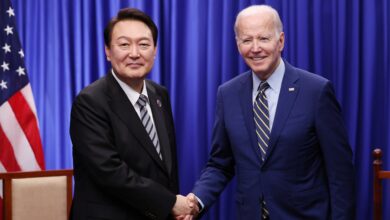Macron, Scholz meet to resolve bilateral tensions

Paris, Oct 26 (EFE).- French president Emmanuel Macron and German chancellor Olaf Scholz met at the Elysée Palace in Paris Wednesday to address the growing disagreements between the two neighbors that led to the postponement of a bilateral summit.
The meeting was agreed by both sides amid growing differences in several key policy areas, such as defense and energy, which led to the delay of the Franco-German summit scheduled for Wednesday in Fontainebleau.
Although officials have attributed the delay to scheduling problems for several ministers, in recent weeks Paris and Berlin have maintained sharply divergent positions, especially on EU energy policy in the wake of Russia’s invasion of Ukraine.
France wants to apply the so-called “Iberian exception” throughout the EU in order to be able to lower electricity prices, which Germany opposes.
In addition, the German government strongly supported the MidCat gas pipeline project between Spain and France, which has been abandoned in favor of an underwater hydrogen pipeline linking Barcelona and Marseille.
In recent weeks, several defense issues, such as the anti-missile shield project launched by Berlin, and some differences over the development of the future European fighter jet, have further complicated the relationship between the EU’s and the euro’s two leading powers.
Commentators have also insisted on the lack of rapport between Macron and Scholz, who came to office in December 2021, particularly compared to the close relationship the French leader enjoyed with Scholz’s predecessor, Angela Merkel.
Minutes before Scholz arrived at the Elysée, the French government spokesman, Olivier Véran, attempted to play down the misunderstandings between the two countries and to stress that, since Emmanuel Macron has been president, Paris and Berlin have made progress “in all areas.”
“We intend to keep this Franco-German axis going and the German chancellor’s visit at this time (…) shows that this friendship is alive and demonstrates our will to move forward together,” Véran said before adding that this includes “facing the difficulties of the moment when the priorities of one country do not coincide with those of the other.” EFE
rcf/ks/jt





